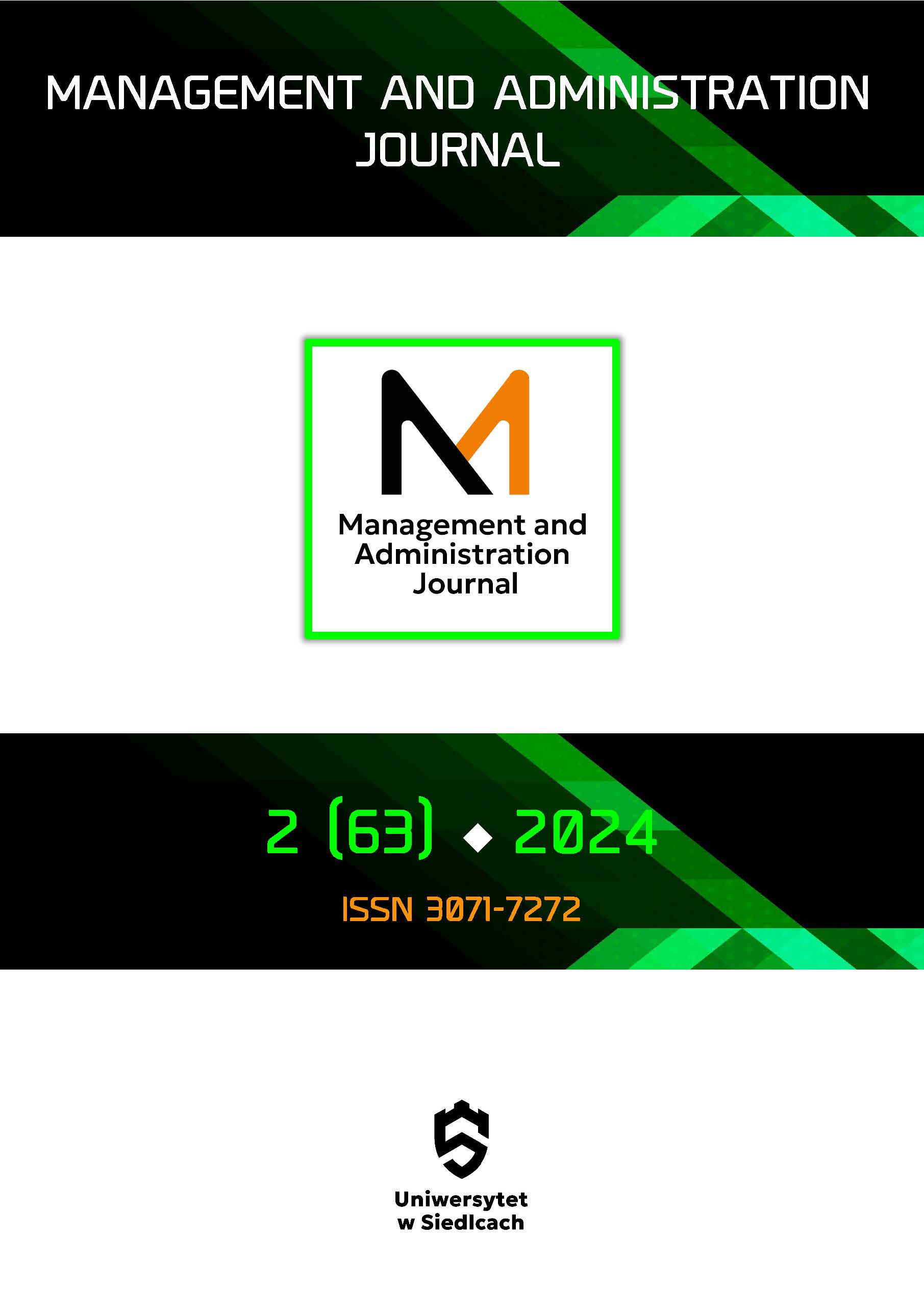THE IMPACT OF CAREER PLATEAUS ON EMPLOYEE JOB SATISFACTION. THE MODERATING ROLE OF REMOTE WORK
DOI:
https://doi.org/10.34739/maj.2024.02.11Keywords:
Career Plateau, Job Satisfaction, Remote WorkAbstract
This study examines the impact of career plateaus on job satisfaction, highlighting the moderating role of
remote work. Career plateau, characterized by limited career advancement opportunities, has been identified as a significant detractor of employee engagement and satisfaction. Leveraging the flexibility and autonomy of remote work, this research explores its potential to mitigate the adverse effects of career stagnation. A quantitative methodology was applied, analyzing survey data from public and private sector employees in Georgia using linear regression to test the hypotheses. The findings confirm a negative correlation between career plateau and job satisfaction, while greater autonomy in remote work significantly enhances job satisfaction levels. The study underscores the necessity of implementing job-design strategies that incorporate flexible employment forms as a means to counteract the effects of career stagnation and promote employee well-being.
Downloads
References
Abele, A. E., Volmer, J., , Spurk, D. (2012). Career stagnation: Underlying dilemmas and solutions in contemporary work environments. In Work and Quality of Life: Ethical Practices in Organizations (pp. 107–132). Springer Netherlands. https://doi.org/10.1007/978-94-007-4059-4_7
Abdullah, N. G., Mercan, M., , Matin, A. (2022). Impact of Empowerment Types on Service Quality: A Case Study among SMEs. Journal of Business, 11(1), 7–23. https://doi.org/10.31578/job.v11i1.197
Appelbaum H, S. (1997). Career development in the plateaued organization.
Arian, M.,Khoshtaria, T., Mercan, M., Asashvili, L.(2024). The effect of consumption experience on self-perception, willingness to pay, and purchase intention toward green products among Generation Z. International Journal of Green Economics (IJGE), Vol. 18, No. 3, 2024. DOI: 10.1504/IJGE.2024.141406
Aslantas, M. (2024). The Effect of Talent Management Strategies on Work Engagement in the Finance Sector: A Study on Bank Employees. DergiPark (Istanbul University). https://dergipark.org.tr/tr/pub/asead/issue/84469/1466859
Aslantas, M. (2024). Comparative Analysis of Employees’ Work Engagement Behavior With Turnover Intention. Journal of Global Social Sciences, 5(17), 1–18. https://doi.org/10.58934/jgss.v5i17.241
Bond, F. W., , Bunce, D. (2000). Mediators of Change in Emotion-Focused and Problem-Focused Worksite Stress Management Interventions. Journal of Occupational Health Psychology, 20(10), 156–163. https://doi.org/10.1037/1076-8Q98
Brough, P., Timms, C., O’Driscoll, M. P., Kalliath, T., Siu, O. L., Sit, C., , Lo, D. (2014). Work–life balance: A longitudinal evaluation of a new measure across Australia and New Zealand workers. International Journal of Human Resource Management, 25(19), 2724–2744. https://doi.org/10.1080/09585192.2014.899262
Chao. (1990). Exploration of the Conceptualization and Measurement of Career Plateau: A Comparative Analysis. Journal of Management, 16.
Cropanzano, R., , Mitchell, M. S. (2005). Social exchange theory: An Interdisciplinary review. In Journal of Management (Vol. 31, Issue 6, pp. 874–900). https://doi.org/10.1177/0149206305279602
Devi, S. A. R., , Basariya, R. S. (2017). Career Plateau of Employees and its Causes. International Journal of Advanced Research in Science, Engineering and Technology, 4(3), 3589–3592.
Ference, T. P., Stoner, J. A., , Kirby Warren, E. (1977). Managing the Career Plateau. In Source: The Academy of Management Review (Vol. 2, Issue 4).
Godshalk, V. M., , Fender, C. M. (2015). External and Internal Reasons for Career Plateauing: Relationships With Work Outcomes. Group and Organization Management, 40(4), 529–559. https://doi.org/10.1177/1059601114558062
Hackman, J. R., , Lawler Iii, E. E. (1971). EMPLOYEE REACTIONS TO JOB CHARACTERISTICS. In JOURNAL OF APPLIED PSYCHOLOGY MONOGRAPH (Vol. 55, Issue 3).
Hu, C., Zhang, S., Chen, Y. Y., , Griggs, T. L. (2022). A meta-analytic study of subjective career plateaus. Journal of Vocational Behavior, 132. https://doi.org/10.1016/j.jvb.2021.103649
Lapalme, M. È., Tremblay, M., , Simard, G. (2009). The relationship between career plateauing, employee commitment and psychological distress: The role of organizational and supervisor support. International Journal of Human Resource Management, 20(5), 1132–1145. https://doi.org/10.1080/09585190902850323
Lentz, E., , Allen, T. D. (2009). The role of mentoring others in the career plateauing phenomenon. Group and Organization Management, 34(3), 358–384. https://doi.org/10.1177/1059601109334027
Khoshtaria, T., Arian, M., Mercan, M., Datuashvili, D. (2021). The impact of customers' purchasing patterns on their showrooming and webrooming behaviour: an empirical evidence from the Georgian retail sector. International Journal of Electronic Marketing and Retailing, 2021 Vol.12 No.4, pp.394 – 413
DOI: 10.1504/IJEMR.2021.118305
Mercan, M., Khoshatria, T., Matin, A., , Sayfullin, S. (2020). The Impact of e-services Quality on Consumer Satisfaction: Empirical Study of Georgian HEI. Journal of Business, 9(2), 15–27. https://doi.org/10.31578/.v9i2.175
Nachbagauer, A. G. M., , Riedl, G. (2002). Effects of concepts of career plateaus on performance, work satisfaction and commitment. International Journal of Manpower, 23(8), 716–733. https://doi.org/10.1108/01437720210453920
Oldham, G. R., Hackman, J. R., , Pearce, J. L. (1976). Conditions under which employees respond positively to enriched work. Journal of Applied Psychology, 61(4), 395–403. https://doi.org/10.1037/0021-9010.61.4.395
Rotondo, D. M., , Perrewé, P. L. (2000). Coping with a career plateau: An empirical examination of what works and what doesn’t. Journal of Applied Social Psychology, 30(12), 2622–2646. https://doi.org/10.1111/j.1559-1816.2000.tb02453.x
Rousseau, D. M., Hansen, S. D., , Tomprou, M. (2018). A dynamic phase model of psychological contract processes. Journal of Organizational Behavior, 39(9), 1081–1098. https://doi.org/10.1002/job.2284
R.S.Lazarus S. Folkman. (1984). STRESS, APPRAISAL, AND COPING.
Schall, M. A. (2019). The Relationship Between Remote Work and Job Satisfaction [San Jose State University]. https://doi.org/10.31979/etd.2x82-58pg
Singh, D. (2019). A Literature Review on Employee Retention with Focus on Recent Trends. International Journal of Scientific Research in Science, Engineering and Technology, 425–431. https://doi.org/10.32628/ijsrst195463
Tremblay, M., Dahan, J., , Gianecchini, M. (2014). The mediating influence of career success in relationship between career mobility criteria, career anchors and satisfaction with organization. Personnel Review, 43(6), 818–844. https://doi.org/10.1108/PR-08-2012-0138
Yi-chun Lin (2020) n Academy of Management Proceedings; DOI: 10.5465/AMBPP.2020.20787
Yang, W. N., Niven, K., , Johnson, S. (2019). Career plateau: A review of 40 years of research. In Journal of Vocational Behavior (Vol. 110, pp. 286–302). Academic Press Inc. https://doi.org/10.1016/j.jvb.2018.11.005
Downloads
Published
Issue
Section
License
Copyright (c) 2024 Management and Administration Journal

This work is licensed under a Creative Commons Attribution-NonCommercial 4.0 International License.





